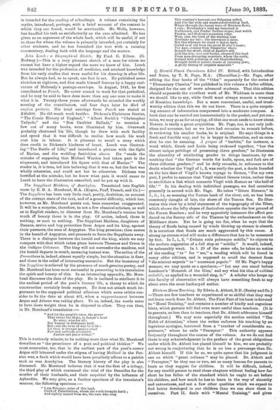Q. Horatii Flacci Oarminum Libri 1V. Edited, with Introduction* and
Notes, by T. E. Page, MA. (Macmillan.)—Mr. Page, after editing the four books of the "Odes" separately for the series of "Elementary Classics," has published in this volume a fuller editions. designed for the use of more advanced students. That this edition should supersede the excellent work of Mr. Wickham is more than we should like to say, while Orelli must always remain a treasury of Horatian knowledge. But a more convenient, useful, and trust- worthy edition than this we do not know. There is a quite surpris- ing amount of information compressed into a moderate compass. A book that can be carried not inconveniently in the pocket, and yet con. tains, we may go as far as saying, all that one most needs to know about Horace, is really a great acquisition. Mr. Page, too, is not only judi- cious and accurate, but as we have had occasion to remark before, in reviewing his smaller books, he is original. He says things in & fresh and forcible way, and he is happy in illustration, and on occa- sion he can be amusing. A propos of " barbite," for instance, a word which, Greek and Latin being reckoned together, "has the- almost unique privilege of possessing .three genders," he illustrates the absurdity of attributing gender to things inanimate, by re- marking that "the German words for knife, spoon, and fork are of three different genders ;" and he drily remarks, in reference to the' doubt whether the Virgil of i., 3, was really the poet, a doubt founded, on the late date of Virgirs known voyage to Greece, "For my own part, I prefer to assume that Virgil visited Greece twice, rather than to annihilate a link which connects Virgil with Horace as the half of life.'" In his dealing With individual passages, we find ourselves generally in accord with Mr. Page. He takes " littera Etrosco," in I., ii., 14, as meaning the Tuscan bank of the river, not, as has been commonly thought of late, the shore of the Tuscan Sea. He illus- trates this view by a brief statement of the topography of the Tiber,. which shows the lofty slopes a Janiculum opposite the low ground of the Forum Boarium; and he very appositely instances the effect pro- duced On the Surrey side of the Thames by the embankment on the' Middlesex shore. But he is going too far,-when be says that the- theory of floods being caused by winds blowing up stream is absurd. It is notorious that floods are much aggravated by this cause. A strong np-stream wind will make a difference that has to be measured by feet. In I., i., 5, "Evitata retie palmaque nobilis," he objects to, the modern suggestion of a full stop at " nobilis." It would, indeed, be unbearably weak. In 1. 29 of the same ode, he takes no notice of the reading " te " for "me," a reading which will be found in. many older editions, and is supposed to avoid the descent from die miscent snperis " to " secernunt populo." Of Mr. Page's happy manner, we may quote as a specimen,—" Let any one stand before- Landseer's 'Monarch of the Glen,' and say what his idea of sub/imi anhelitit, as applied to a wounded stag, is." A scholar who keeps up* this faculty of observation will always have something fresh to say about even the most hackneyed author.


































 Previous page
Previous page